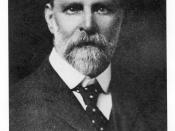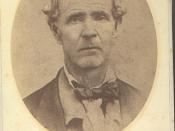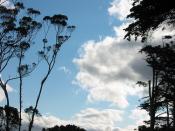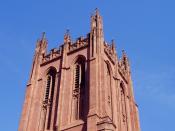One of the most moving English metaphysical poets was Henry Vaughan, his religious poetry inspired many people, and inspired more. Some of his greatest works are poems like, "The Morning Watch" "They Are All Gone Into The World Of Light" "The Star" "Peace" and "The Waterfall". His work is still today highly admired.
Henry Vaughan was born in 1621 to Thomas Vaughan of Tretower, and Denise Morgan in the tiny town of Newton-Upon-Usk in Breconshire, Wales, which was once inhabited by a tribe called the Silures. Later Vaughan would call himself a Silurist after the ancient inhabitants of that region.1 He was not alone in the birthing process as his twin brother, Thomas was born also. They both would later be the oldest surviving children of Thomas Vaughan and his wife.
The date is not entirely known, but is thought to be in the year of 1628, William, their brother was born and his coming to life discouraged Thomas and Henry Vaughan as they had high hopes to be doctors and philosophers.
With the new addition to the family, there wouldn't be enough money to send the two brothers to University.
In approximately1638 Vaughan and his brother, Thomas, after working hard and saving their money, entered Oxford University together on their own funds. Thomas gained fame as a hermetic philosopher and alchemist and also earned Henry Vaughan's anger and jealously. Vaughan had been at Oxford for several years and had not accomplished a thing. Seeing that Oxford had no future for him, Vaughan left Oxford without a degree and turned to study law in London for two years. Vaughan returned to Breconshire, his home town, in 1642 as a secretary to Judge Lloyd, someone he often 1 1 The Top 500 Poems William Harmon 1992 talked to and studied with in his younger school days. His studies were interrupted by the civil war in which Vaughan briefly took the King's side. Vaughan had served on the Royalist side in South Wales sometime in the year 1645.2 After the war, in 1646, Vaughan returned to his studies and began to practice medicine and was soon a highly respected physician. While working as a physician he met a young woman, Catherine Wise, with whom he fell in love with. In the same year he married her and had a son, Thomas, named after with twin brother, and later three daughters, Lucy, Frances and Catherine, named after her mother.3 Vaughan began to write poetry as he settled down with his wife. His main inspiration was the poetry of George Herbert. Later in 1646 Henry Vaughan had his first book of poetry published, which was entitled Poems with the Tenth Satire of Juvenal Englished. In July of 1648 Henry Vaughan and Thomas's younger brother William Vaughan died, which devastated both brothers as they had come to love their younger brother. It is said that the death of his younger brother had pushed Vaughan to write poetry about religion. Henry Vaughan's second book of poetry was published in 1650. It was entitled Silex Scintillans which was a collection of religious poems and is thought to be one of his greatest works and achievements.4 2 The Life of Henry Vaughan Anniina Jokinen 1996 3 Henry Vaughan Chronology Anniina Jokinen 1996 4 The Top 500 Poems William Harmon 1992 A year following Silex Scintillans Olor Iscanus or as it is also known The Swan of Usk was published. It was a collection of secular poetry and four prose stories. The poetry in Olar Iscanus is mostly about the rhapsodic passages about the natural world. Vaughan had some religious poetry in this book but there was only a hand full of them.
Silex Scintillans was reprinted in 1655, and a second part added of more religious poetry which was about Vaughan's spiritual awakening when his younger brother died.
In 1655 Vaughan remarried after his first wife's death. He married his wife's sister, Elizabeth, that year. With his second wife, Vaughan had another son, Henry and three more daughters, Grisell, Lucy and Rachel.5 In 1689, Henry Vaughan and Elizabeth Vaughan moved to a cottage in Scethrog to vacate the house at Newton, where Vaughan was born and lived for most of his life, in favor of Thomas's cottage, Vaughan's son by his first marriage.
April 23, 1695, Henry Vaughan died and was buried in Llansantffraed churchyard.
Henry Vaughan was hailed a great English metaphysical poet and passionate feelings of his works affected William Wordsworth very strongly, a century after his death.6 5 Henry Vaughan Chronology Anniina Jokinen 1996 6 Henry Vaughan L.C. Martin 2001 Characteristics of Henry Vaughan's poetry is that he usually only wrote about religion. The poems and the few short stories he wrote had religious meanings.
Most of his poems are between 30-40 stanzas long, there were one or two poems that were under this mark.
In almost every poem Vaughan wrote he has some kind of phrase or a passage from the Bible tied in. He does this so tactfully one can barely tell it is from the Bible unless one looked it up and it always just seems like it should be in the poem.
His poetry usually rhymes and usually has the rhyme scheme ABAB with end rhyme. At the beginning of every line Vaughan capitalizes the first letter and some lines are indented. It is usually every second line and sometimes the indents are of various lengths. Since he was around in the 1600's his poetry is in old English and can be a touch hard to understand, but with a good dictionary at hand, it can be quite well enjoyed. Here is four different examples of Henry Vaughan's poetry followed by an in-depth analyzes of his poem, "The Water-Fall." The Morning Watch7 O joys! Infinite sweetness! With what flow'rs And shoots of glory my soul breaks and buds! All the long hours Of night, and rest, Through the still shrouds Of sleep, and clouds, This dew fell on my breast; Oh, how it bloods 7 Henry Vaughan (1622-1695) Sian Meikle 1997 And spirits all my earth! Hark! In what rings And hymning circulation the quick world Awakes and sings; The rising winds And falling springs, Birds, beasts, all things Adore him in their kinds.
Thus all is hurl'd In scared hymns and order, the great chime And symphony of nature. Prayer is The world in tune, A spirit voice, And vocal joys Whose echo is heav'n's bliss.
O let me climb When I lie down! The pious soul by night Is like a clouded star whose beams, though said To shed their light Under some cloud, Yet are above, And shine and move Beyond that misty shroud.
So in my bed, That curtain'd grave, through sleep, like ashes, hide My lamp and life, both in thee abide.
The poem is about the world and the beauties of it and the Lord watches over all and it a good ruler and his subjects praise him.
The mood the poem is giving is that of a soft, kind atmosphere and it feels like in is a warm summer night or a morning. One can tell the writer is showing his happiness in the earth and wishes to express him or herself. The form of this poem is closed because it has the rhyme scheme of ABACBBCB repeating.
Another example is as follows, They Are All Gone Into The World Of Light8 They are all gone into the world of light! And I alone sit ling'ring here; Their very memory is fair and bright, And my sad thoughts doth clear.
It glows and glitters in my cloudy breast, Like stars upon some gloomy grove, Or those faint beams in which this hill is drest, After the sun's remove.
I see them walking in an air of glory, Whose light doth trample on my days: My days, which are at best but dull and hoary, Mere glimmering and decay.
O holy Hope! And high Humility, High as the heavens above! These are your walks, and you have show'd them me To kindle my cold love.
Dear, beauteous Death! The jewel of the just, Shining nowhere, but in the dark; What mysteries do lie beyond thy dust Could man outlook that mark! He hath found some fledg'd bird's nest may know At first sight, if the bird be flown; But what fair well or grove he sings in now, That is to him unknown.
And yet as angels in some bright dreams Call to the soul, when man doth: So some strange thoughts transcend our wonted themes And into glory peep.
If a star were confin'd into a tomb, Her captive flames must needs burn there; But when the hand that lock'd her up, give room, She'll shine through all the sphere.
8 Henry Vaughan (1622-1695) Sian Meikle 1997 O Father of eternal life, and all Created glories under thee! Resume thy spirit from this world of thrall Into true liberty.
Either disperse these mists, which blot and fill My perspective still as they pass, Or else remove me hence unto that hill, Where I shall need no glass.
The form of this poem of ABAB in its rhyme scheme. The writer is talking about all of his friends and loved ones going up to heaven and how God is taking care of them and that God wishes to be there also. The mood of the poem is that of strength and courage and wanting. The way the poem is presented is interesting the second lines are all indented and they all rhyme.
Another great example is "The Star." The Star9 Whatever 'tis, whose beauty here below Attracts thee thus and makes thee stream and flow, And wind and curl, and wink and smile, Shifting thy gate and guile; Though thy close commerce nought at all imbars My present search, for eagles eye not stars, And still the lesser by the best And highest good is blest; Yet, seeing all things that subsist and be, Have their commissions from divinity, And teach us duty, I will see What man may learn from thee.
9 Henry Vaughan (1622-1695) Sian Meikle 1997 First, I am sure, the subject so respected Is well dispos'd, for bodies once infected, Deprav'd, or dead, can have with thee No hold, nor sympathy.
Next, there's in it a restless, pure desire And longing for thy bright and vital fire, Desire that never will be quench'd, Nor can be writh'd, nor wrench'd.
These are the magnets which so strongly move And work all night upon thy light and love, As beauteous shapes, we know not why, Command and guide the eye.
For where desire, celestial, pure desire Hath taken root, and grows, and doth not tire, There God a commerce states, and sheds His secret on their heads.
This is the heart he craves, and who so will But give it him, and grudge not, he shall feel That God is true, as herbs unseen Put on their youth and green.
This poem is a beautiful example of Vaughan's work. The form is AABB and the way he places the indents in the lines give the lines a descending feeling, and it helps the structure of the poem very wonderful to look at. The mood is that of a calm night and soothing, like the hand of god will reach out and touch one's self.
One last example of Vaughan's work is "Peace." Peace10 My Soul, there is a country Afar beyond the stars, Where stands a winged sentry All skillful in the wars; There, above noise and danger Sweet Peace sits, crown'd with smiles, And One born in a manger Commands the beauteous files.
He is thy gracious friend And (O my Soul awake!) Did in pure love descend, To die here for thy sake.
If thou canst get but thither, There grows the flow'r of peace, The rose that cannot wither, Thy fortress, and thy ease.
Leave then thy foolish ranges, For none can thee secure, But One, who never changes, Thy God, thy life, thy cure.
The form of the poem is ABABCDCD and the indentations of the lines are every second line. This is one of the few poems Vaughan wrote that was not over 30 stanzas long. He wrote this poem very shortly after his first wife died and he was hoping that her spirit was at peace wherever it was. As usual this poem has a very religious meaning.
This next poem is called, "The Water-Fall" and I have studied it in-depth. I have chosen to paraphrase each stanza and also each stanza is numbered and the rhyme scheme is given on the right side, using letters. There is also a paragraph of information following the poem.
10 Henry Vaughan (1622-1695) Sian Meikle 1997 The Water-Fall11 1 With what deep murmurs through time's silent stealth Water falls with a crash, but then it flows silently A 2 Doth thy transparent, cool, and wat'ry wealth Water is cold, and transparent and gives life A 3 Here flowing fall, The water flows and falls - The Waterfall B 4 And chide, and call, To scold and call B 5 As if his liquid, loose retinue stay'd If this water, who follows a high ranking person stayed C 6 Ling'ring, and were of this steep place afraid; The water is afraid to fall from the steep of the ledge, lingering C 7 The common pass The common place D 8 Where, clear as glass, Water is clear as glass D 9 All must descend All water must fall E 10 Not to an end, But not to end E 11 But quicken'd by this deep and rocky grave, Quickened to fall down into a death F 12 Rise to a longer course more bright and brave.
To continue a journey to a more wonderful future F 13 Dear stream! Dear bank, where often I Adressing the stream and bank where the write as often G 14 Have sate and pleas'd my pensive eye, Sat and watched with a wistful eye G 15 Why, since each drop of thy quick store, Each drop of water H 16 Runs thither whence it flow'd before, Water is always flowing where it was before H 17 Should poor souls fear a shade or night, Should someone fear the dark I 18 Who came, sure, from a sea of light? Water evaporates from the sun I 19 Or since those drops are all sent back Since the drops of water are all sent back in the rain J 11 Henry Vaughan (1622-1695) Sian Meikle 1997 20 So sure to thee, that none doth lack None does that lack J 21 Why should frail flesh doubt any more Humans should not wonder anymore K 22 That what God takes, he'll not restore? What God takes he doesn't restore? K 23 O useful element and clear! Water is useful L 24 My sacred wash and cleanser Very special washer and cleanser L 25 My first consigner unto those First trust to others M 26 Fountains of life where the Lamb goes! Revelation 7:17 M 27 What sublime truths and wholesome themes Sublime truths and themes N 28 Lodge in thy mystical deep streams! Are hidden in the deep streams N 29 Such as dull man can never find A boring man with never find anything O 30 Unless that Spirit lead his mind Unless a boring spirit leads his brain O 31 Which first upon thy face did move, Genesis 1:2 P 32 And hatch'd all with his quick'ning love.
Dove with his love P 33 As this loud brook's incessant fall Loud sound of water falling Q 34 In streaming rings restagnates all, The water rings makes everything alright Q 35 Which reach by course the bank, and then The water reaches the bank R 36 Are no more seen, just so pass men.
The water is clear and not seen by people passing by R 37 O my invisible estate, Water is clear S 38 My glorious liberty, still late! Something is late S 39 Thou art the channel my soul seeks, The path his soul seeks T 40 Not this with cataracts and creeks.
Not this waterfall and creeks T I choose this poet, Henry Vaughan, because of his wonderful use of words and imagery. At first I was looking for a poet who wrote fantasy type poetry, but when I found Henry Vaughan I knew I had to do him. The way he ties in religion and emotions he expresses through his poetry, one can always tell what kind of mood he is in and the poetry can sometimes even put one into that kind of mood. The depth of his poetry is so amazing that if one sits reading his poetry one could hear his pen writing on the paper.
Works Consulted Harmon, William Top 500 Poems, The New York Columbia University Press. 1992 Jokinen, Anniina Life of Henry Vaughan, The Http://www.luminarium.org/sevenlit/vaughan/vaughbio.htm Anniina Jokinen 1997 Jokinen, Anniina Henry Vaughan Chronology Http://www.luminarium.org/sevenlit/vaughan/vaughtime.htm Anniina Jokinen 1997 Martin, L.C. Henry Vaughan Http://www.bartleby.com/65/VaughanHn.html Columbia University Press. 2001 Meikle, Sian Henry Vaughan (1622-1695) Http://www.library.utoronto.ca/utel/rp/poems/vaughan.html University of Toronto 1997




